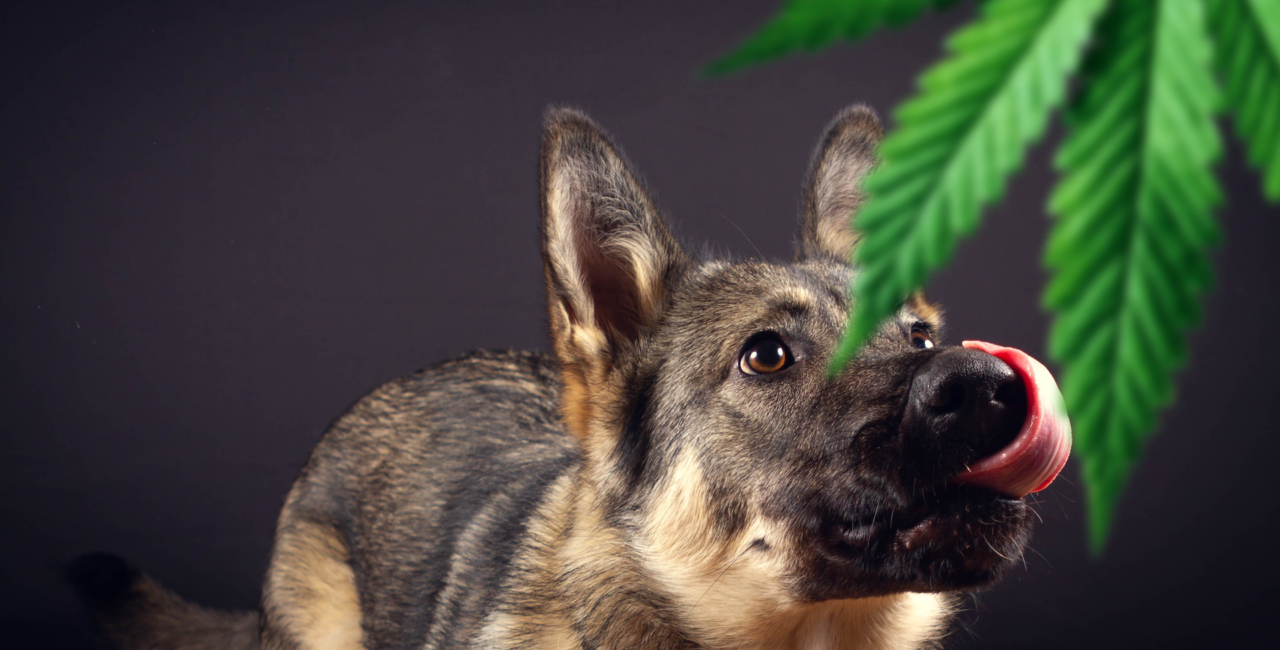New laws regarding the legal consumption of marijuana, or cannabis, in Ontario has led to an increase in exposure of the drug to family pets. We are now seeing more cases of marijuana toxicity, primarily in dogs.
While marijuana might offer health benefits for some adults suffering from various chronic illnesses, this primarily natural drug is known to affect animals much differently. Marijuana is specifically toxic to dogs, cats, and horses.
What makes marijuana toxic or potentially dangerous?
There are over 113 different cannabinoids – the chemical compounds that act on cannabinoid receptors in the cells of humans, dogs, cats, and horses. When marijuana is inhaled or ingested, the drug binds with specific neuroreceptors in the brain, altering normal neurotransmitter function. This altered neurotransmitter function is what cause various effects ranging from psychoactive symptoms, to relief from nausea and an increase in drowsiness.
Tetrahydrocannabinol (THC) and cannabidiol (CBD) are the two most commonly recognized cannabinoids. THC is known to cause psychotropic effects (i.e. altering mental states) and has a moderate level of toxicity, while CBD is non-psychotropic and may present limited toxicity. The amount of each cannabinoid varies between the many different strains of marijuana plants, and is important to note when using the drug for medical or recreational purposes.
How does marijuana affect my pet?
Family pets are typically exposed to marijuana through consumption of edible forms of the drug (pot infused baked goods, butters, etc.), or by eating any other forms of the drug that may be kept in the home (i.e. joints, dried marijuana, marijuana plants, etc.). Pets can also be exposed to marijuana by inhaling second hand smoke.
Symptoms of marijuana toxicity in pets
Common symptoms of marijuana toxicity in cats and dogs include:
- Ataxia – a wobbly and uncoordinated gait
- Disorientation
- Vocalizing or crying
- Hyperactivity
- Depression
- Dilated pupils
- Excessive drooling
- Urinary dribbling, leakage or incontinence
- Low heart rate
- Increased heart rate
- Difficulty regulating body temperature
- Tremors
- Seizures, possibly coma
In addition to the symptoms listed above, cases of marijuana toxicity can potentially lead to additional health concerns such as aspiration pneumonia. If your pet has consumed a pot-infused edible, additional toxicities can also be a concern.
My pet ingested marijuana – what should I do?
Symptoms of marijuana toxicity can be seen anywhere from 5 minutes to 12 hours after the animal is exposed to the toxin. These symptoms can persist for 30 minutes to several days depending on the dose ingested and the size of your pet.
If you suspect your pet has been exposed to marijuana, we recommend visiting our emergency animal hospital as soon as possible.
How do you treat marijuana toxicity in animals?
Removing the toxin from your pet is the first step in resolving marijuana toxicity. As with any toxicity, time is of the essence.
If you discover marijuana toxicity shortly after ingestion, be sure to visit your nearest emergency veterinary hospital. If possible, your veterinarian may try to induce vomiting to prevent any further absorption of the toxin.
Unfortunately, many pet owners don’t recognize the symptoms of marijuana toxicity until after the drug has already been absorbed into the system. In addition, cannabis does provide an anti-emetic effect, which can inhibit vomiting in some patients. When vomiting is not an option to prevent further absorption, activated charcoal may be administered every 6-8 hours to neutralize the toxin.
Supportive care is also paramount in treating marijuana toxicity in pets. Your pet may be hospitalized as we monitor progress and wait for the effects of the drug to wear off.
Supportive care ensures that we are monitoring and regulating your pet’s heart rate, respiration, and body temperature. IV fluids may also be administered to prevent dehydration, support blood pressure, and maintain organ function. Keeping your pet in a safe, comfortable and confined space will help prevent or reduce self-harm, as your pet may remain disoriented and uncoordinated until the toxin has been sufficiently flushed from the system.
Walker Road Animal Hospital is here to help
If you suspect your pet may have ingested cannabis, please call Walker Road Animal Hospital at 519-972-9000. Our experienced team of veterinarians, registered veterinary technicians, and veterinary support staff, is here to help.
For more information on marijuana toxicity in pets, please visit the Pet Poison Helpline or the ASPCA Animal Poison Control website.




